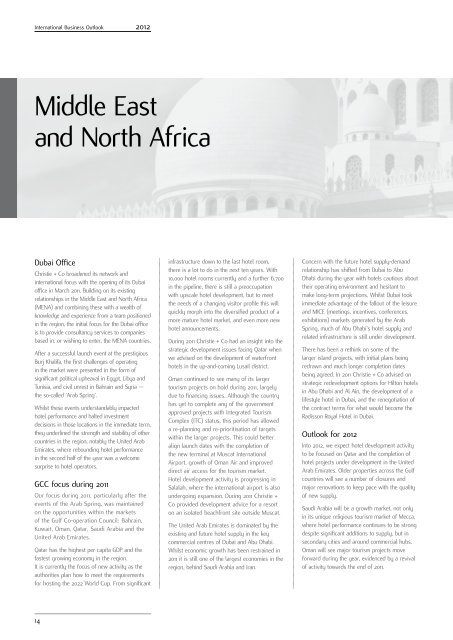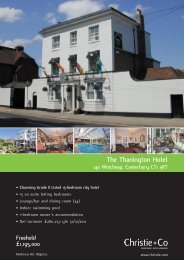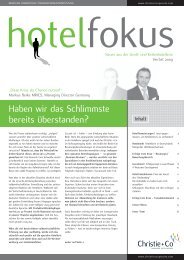Case Studies - Christie + Co
Case Studies - Christie + Co
Case Studies - Christie + Co
Create successful ePaper yourself
Turn your PDF publications into a flip-book with our unique Google optimized e-Paper software.
International Business Outlook 2012<br />
Middle East<br />
and North Africa<br />
Dubai Office<br />
<strong>Christie</strong> + <strong>Co</strong> broadened its network and<br />
international focus with the opening of its Dubai<br />
office in March 2011. Building on its existing<br />
relationships in the Middle East and North Africa<br />
(MENA) and combining these with a wealth of<br />
knowledge and experience from a team positioned<br />
in the region, the initial focus for the Dubai office<br />
is to provide consultancy services to companies<br />
based in, or wishing to enter, the MENA countries.<br />
After a successful launch event at the prestigious<br />
Burj Khalifa, the first challenges of operating<br />
in the market were presented in the form of<br />
significant political upheaval in Egypt, Libya and<br />
Tunisia, and civil unrest in Bahrain and Syria —<br />
the so-called ‘Arab Spring’.<br />
Whilst these events understandably impacted<br />
hotel performance and halted investment<br />
decisions in those locations in the immediate term,<br />
they underlined the strength and stability of other<br />
countries in the region, notably the United Arab<br />
Emirates, where rebounding hotel performance<br />
in the second half of the year was a welcome<br />
surprise to hotel operators.<br />
GCC focus during 2011<br />
Our focus during 2011, particularly after the<br />
events of the Arab Spring, was maintained<br />
on the opportunities within the markets<br />
of the Gulf <strong>Co</strong>-operation <strong>Co</strong>uncil: Bahrain,<br />
Kuwait, Oman, Qatar, Saudi Arabia and the<br />
United Arab Emirates.<br />
Qatar has the highest per capita GDP and the<br />
fastest growing economy in the region.<br />
It is currently the focus of new activity as the<br />
authorities plan how to meet the requirements<br />
for hosting the 2022 World Cup. From significant<br />
14<br />
infrastructure down to the last hotel room,<br />
there is a lot to do in the next ten years. With<br />
10,000 hotel rooms currently and a further 6,700<br />
in the pipeline, there is still a preoccupation<br />
with upscale hotel development, but to meet<br />
the needs of a changing visitor profile this will<br />
quickly morph into the diversified product of a<br />
more mature hotel market, and even more new<br />
hotel announcements.<br />
During 2011 <strong>Christie</strong> + <strong>Co</strong> had an insight into the<br />
strategic development issues facing Qatar when<br />
we advised on the development of waterfront<br />
hotels in the up-and-coming Lusail district.<br />
Oman continued to see many of its larger<br />
tourism projects on hold during 2011, largely<br />
due to financing issues. Although the country<br />
has yet to complete any of the government<br />
approved projects with Integrated Tourism<br />
<strong>Co</strong>mplex (ITC) status, this period has allowed<br />
a re-planning and re-prioritisation of targets<br />
within the larger projects. This could better<br />
align launch dates with the completion of<br />
the new terminal at Muscat International<br />
Airport, growth of Oman Air and improved<br />
direct air access for the tourism market.<br />
Hotel development activity is progressing in<br />
Salalah, where the international airport is also<br />
undergoing expansion. During 2011 <strong>Christie</strong> +<br />
<strong>Co</strong> provided development advice for a resort<br />
on an isolated beachfront site outside Muscat.<br />
The United Arab Emirates is dominated by the<br />
existing and future hotel supply in the key<br />
commercial centres of Dubai and Abu Dhabi.<br />
Whilst economic growth has been restrained in<br />
2011 it is still one of the largest economies in the<br />
region, behind Saudi Arabia and Iran.<br />
<strong>Co</strong>ncern with the future hotel supply-demand<br />
relationship has shifted from Dubai to Abu<br />
Dhabi during the year with hotels cautious about<br />
their operating environment and hesitant to<br />
make long-term projections. Whilst Dubai took<br />
immediate advantage of the fallout of the leisure<br />
and MICE (meetings, incentives, conferences,<br />
exhibitions) markets generated by the Arab<br />
Spring, much of Abu Dhabi’s hotel supply and<br />
related infrastructure is still under development.<br />
There has been a rethink on some of the<br />
larger island projects, with initial plans being<br />
redrawn and much longer completion dates<br />
being agreed. In 2011 <strong>Christie</strong> + <strong>Co</strong> advised on<br />
strategic redevelopment options for Hilton hotels<br />
in Abu Dhabi and Al Ain, the development of a<br />
lifestyle hotel in Dubai, and the renegotiation of<br />
the contract terms for what would become the<br />
Radisson Royal Hotel in Dubai.<br />
Outlook for 2012<br />
Into 2012, we expect hotel development activity<br />
to be focused on Qatar and the completion of<br />
hotel projects under development in the United<br />
Arab Emirates. Older properties across the Gulf<br />
countries will see a number of closures and<br />
major renovations to keep pace with the quality<br />
of new supply.<br />
Saudi Arabia will be a growth market, not only<br />
in its unique religious tourism market of Mecca,<br />
where hotel performance continues to be strong<br />
despite significant additions to supply, but in<br />
secondary cities and around commercial hubs.<br />
Oman will see major tourism projects move<br />
forward during the year, evidenced by a revival<br />
of activity towards the end of 2011.






